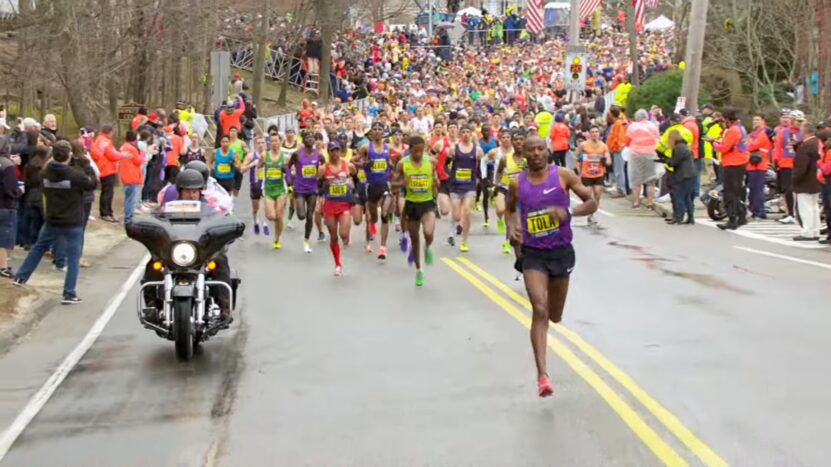The Boston Marathon stands as a golden emblem for long-distance runners worldwide. If you’ve found yourself contemplating the steps needed to qualify and participate in this iconic event, you’re in the right place.
It doesn’t really matter whether you’re a novice runner or a seasoned marathoner, our guide offers a roadmap to achieving that Boston qualifying time.
The Boston Marathon Qualifying Standards
Qualifying for the Boston Marathon is no mean feat. Each year, the Boston Athletic Association (B.A.A.) sets qualifying standards that runners need to meet to secure a spot. These times vary based on age and gender, ensuring fairness across all groups.
Current Qualifying Times
The B.A.A. frequently revisits and updates the qualifying standards. Here are the general standards for various age and gender groups:
| Age Group | MEN | WOMEN |
|---|---|---|
| 18-34 | 3hrs 00min 00sec | 3hrs 30min 00sec |
| 35-39 | 3hrs 05min 00sec | 3hrs 35min 00sec |
| 40-44 | 3hrs 10min 00sec | 3hrs 40min 00sec |
| 45-49 | 3hrs 20min 00sec | 3hrs 50min 00sec |
| 50-54 | 3hrs 25min 00sec | 3hrs 55min 00sec |
| 55-59 | 3hrs 35min 00sec | 4hrs 05min 00sec |
| 60-64 | 3hrs 50min 00sec | 4hrs 20min 00sec |
| 65-69 | 4hrs 05min 00sec | 4hrs 35min 00sec |
| 70-74 | 4hrs 20min 00sec | 4hrs 50min 00sec |
| 75-79 | 4hrs 35min 00sec | 5hrs 05min 00sec |
| 80 and over | 4hrs 50min 00sec | 5hrs 20min 00sec |
Changes Over the Years
It’s essential to note that the qualifying standards have become progressively more stringent. As more runners take to marathons, the competition for those coveted Boston spots increases.
In past decades, the standards were more lenient, but with the increasing number of marathon runners globally, the times have dropped.
Training for the Qualifying Time

Achieving a Boston qualifying time requires dedicated training, strategy, and physical preparedness. It’s not merely about running; it’s about running smartly and efficiently.
Developing a Marathon Training Plan
To maximize your chances, consider these steps:
- Set a realistic goal: Analyze your current performance and set a goal that’s challenging yet achievable.
- Build your base: Start with a foundation of consistent running before diving into intense workouts.
- Vary your training: Incorporate long runs, interval training, hill workouts, and recovery runs.
- Cross-train: Engage in other activities like cycling, swimming, or strength training to enhance your overall fitness.
Importance of Recovery
Recovery is as crucial as the workouts themselves. Overtraining can lead to injuries, burnout, and decreased performance. Remember:
- Rest days are essential: They allow your muscles to repair and grow stronger.
- Hydrate and refuel: Post-run nutrition is crucial to replenish the glycogen stores and repair muscle tears.
- Consider active recovery: Activities like yoga, stretching, and light swimming can keep you active without straining your muscles.
Choosing the Right Qualifying Race
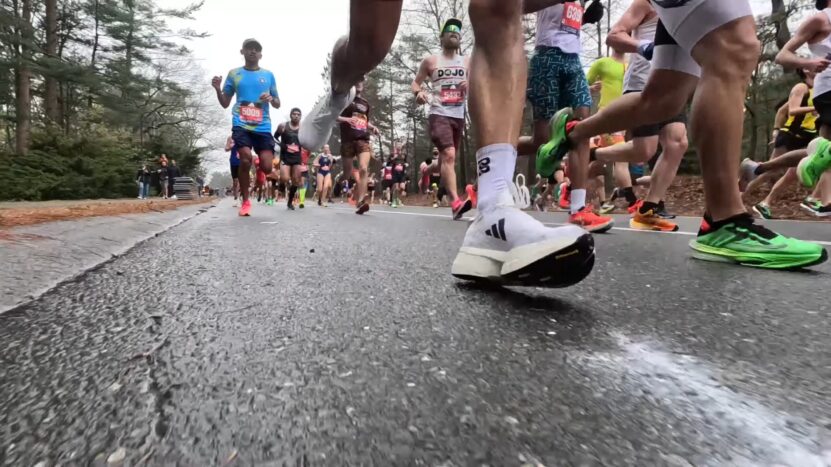
Not all marathons are created equal. To give yourself the best shot, you’ll want to pick a race that plays to your strengths and gives you the best chance to hit your qualifying time.
Course Elevation and Climate
Some courses are hilly, and others are flat. Some races might be held in humid conditions, while others are in cooler climates. Factors to consider:
- Elevation: A flatter course might be favorable for faster times.
- Weather: Cooler, less humid conditions can be more conducive to achieving your best performance.
- Crowd support: A supportive crowd can be a motivational boost, especially during those tough miles.
Validated Courses
Ensure the marathon you choose is a certified course. The B.A.A. requires that qualifying times be achieved on courses certified by USA Track & Field or a foreign equivalent.
It ensures the course is accurately measured and meets specific criteria, guaranteeing all runners cover the full marathon distance.
Nutrition and Hydration
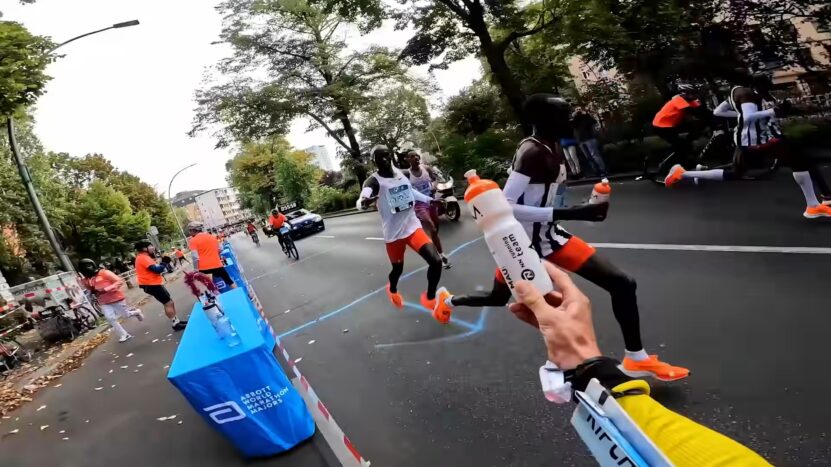
Fueling your body correctly can make the difference between hitting that qualifying time and missing out. The significance of nutrition and hydration cannot be overstated for marathon runners.
Diet Leading Up to the Race
In the weeks leading up to your qualifying race, consider these nutritional strategies:
- Carbohydrate loading: A few days before the race, increase your carbohydrate intake. This maximizes the storage of glycogen, an essential energy source during prolonged running.
- Protein: Incorporate lean proteins to repair and build muscles. Chicken, fish, tofu, and legumes are good options.
- Stay hydrated: Drink enough water in the days leading up to the race, but don’t overhydrate.
Race Day Nutrition
Your race day diet can make or break your performance.
- Breakfast: Eat a familiar, carb-rich meal 3-4 hours before the race. Oatmeal with bananas or a bagel with peanut butter are good options.
- During the race: Consider energy gels or chews to maintain your energy levels. Practice your nutrition strategy during training runs.
- Post-race: Refuel with a combination of proteins and carbs to aid recovery.
Mental Preparation and Strategy
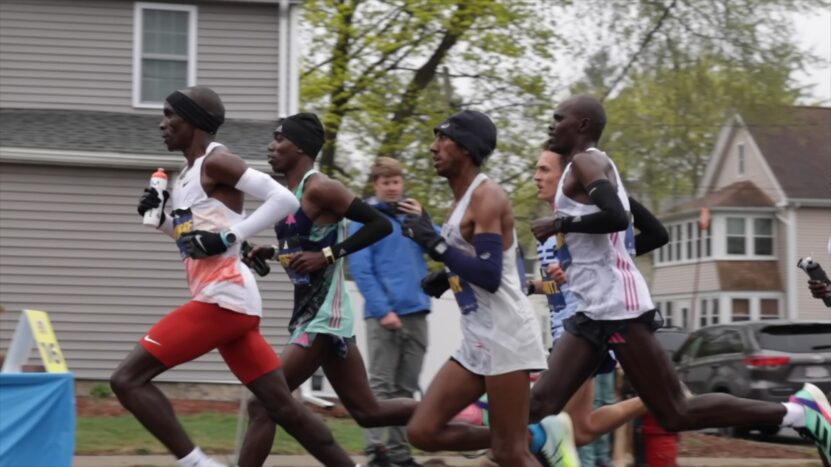
Running a marathon is as much a mental challenge as it is a physical one. Preparing your mind can give you that edge needed to qualify.
Building Mental Resilience
To strengthen your mental game:
- Visualization: Regularly imagine yourself running the course, handling challenging patches, and crossing the finish line within your goal time.
- Stay positive: Replace negative self-talk with affirmations. Believe in your training and your capability.
- Break the race into sections: Instead of viewing it as a single 26.2-mile challenge, break it down into smaller, more manageable chunks.
Pacing Strategy
Pacing is paramount. Going out too fast can exhaust you early, while starting too slow might leave too much ground to make up.
- Know your pace: Familiarize yourself with the pace you need to hit your qualifying time.
- Use technology: Running watches or apps can help you monitor your pace in real-time.
- Run with a group: Many races have pace groups. Running with a group targeting your desired finish time can be beneficial.
Post-Race Reflection and Next Steps
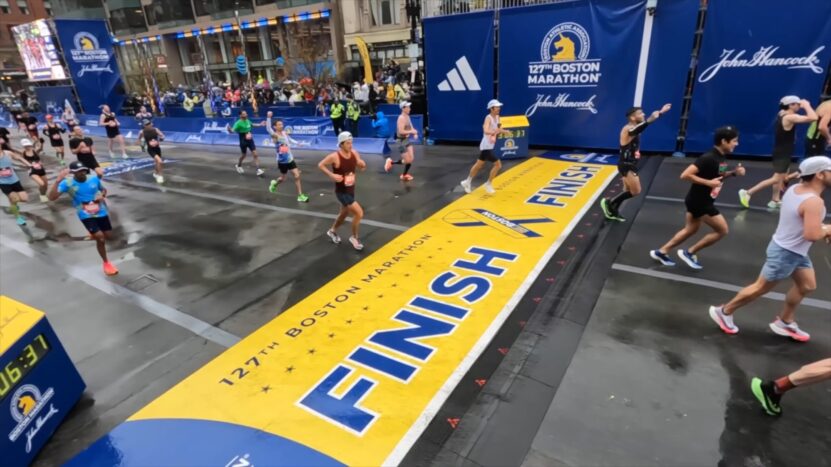
Regardless of the outcome on race day, it’s crucial to reflect on the experience and plan for the future.
Analyzing Your Performance
After the race, evaluate your performance:
- Strengths: Celebrate the parts of the race where you felt strong and on target.
- Areas for improvement: Were there stages where you struggled? Determine what factors contributed and how you can address them in the future.
Planning Ahead
If you achieved your qualifying time, congratulations! Now, prepare for the Boston Marathon. If you fell short:
- Stay motivated: Remember that many runners need multiple attempts to qualify.
- Seek feedback: Talk to coaches or fellow runners. They might provide insights or training tips you hadn’t considered.
Injury Prevention and Management

Injuries are a runner’s worst nightmare, especially when aiming for a goal as significant as qualifying for the Boston Marathon. Understanding prevention and management can ensure you reach the starting line in the best shape possible.
Common Running Injuries and Their Prevention
Runners face various injuries, but some of the most common include:
- Shin splints: Caused by overuse or an increase in training intensity. Prevention includes proper footwear and strengthening exercises.
- Plantar fasciitis: Results from strain in the foot’s bottom tissues. Prevent by ensuring proper footwear and regular foot stretches.
- Runner’s knee: Caused by imbalances or misalignment in the legs or feet. Strengthening the hips and thighs can help in prevention.
Addressing Injuries
If an injury occurs:
- Immediate attention: Use the R.I.C.E. method (Rest, Ice, Compression, Elevation) as a first response.
- Seek professional help: Consult a physical therapist or sports medicine doctor.
- Modify training: Adjust your routine to avoid further strain on the injured area.
The Role of a Support System
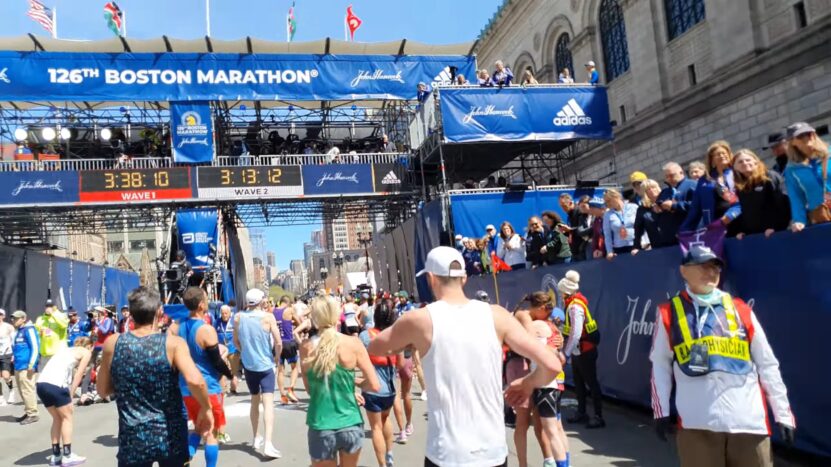
Behind every successful marathoner is a solid support system. Friends, family, coaches, and running communities play an essential part in a runner’s journey.
The Power of Community
Joining a running club or group offers numerous benefits:
- Structured workouts: Many groups have coaches providing guided sessions.
- Motivation: Running with others can keep you accountable and push you harder.
- Social aspect: Sharing the highs and lows with like-minded individuals can be rewarding.
Leveraging Technology and Social Media
Modern-day runners have a plethora of technological tools at their disposal:
- Running apps: Track progress, plan workouts, and analyze performance.
- Online communities: Platforms like Strava or Runner’s World forums provide a space for sharing experiences and advice.
- Virtual races: Can’t find a qualifying race nearby? Virtual races offer a chance to compete from anywhere.
FAQs
Why is there a qualifying standard for the Boston Marathon?
Due to its prestige and popularity, there’s an overwhelming number of runners who wish to participate. To manage this demand and maintain a high standard of competition, the B.A.A. has set qualifying times based on age and gender.
Can I qualify in any marathon?
No, your qualifying time must be achieved on a marathon course certified by USA Track & Field or its foreign equivalent. Always check the validity of the marathon event before participating if you aim to qualify for Boston.
I achieved the qualifying time. Does this guarantee my entry?
Achieving a qualifying time does not guarantee entry, but it allows you to submit an application. Due to the high number of qualifiers, the B.A.A. often admits runners who’ve beaten their qualifying standard by the largest margin first.
Summary
As we reach the finish line of this guide, it’s vital to remember that the quest to qualify for the Boston Marathon is much more than just achieving a set time. It’s a testament to perseverance, discipline, and the indomitable human spirit.
Each step, each mile, each bead of sweat contributes to a narrative of determination and growth.
